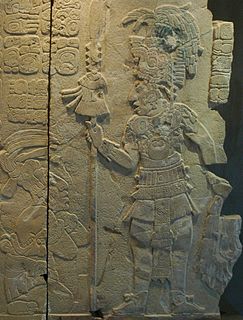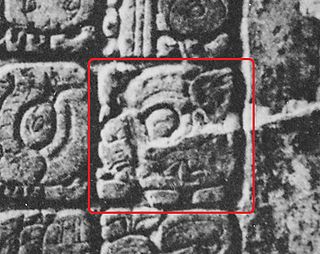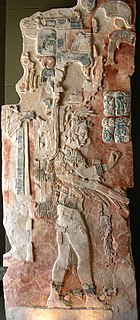Year 524 (DXXIV) was a leap year starting on Monday on the Julian calendar. At the time, it was known as the Year of the Consulship of Iustinus and Opilio. The denomination 524 for this year has been used since the early medieval period, when the Anno Domini calendar era became the prevalent method in Europe for naming years.
Year 722 (DCCXXII) was a common year starting on Thursday of the Julian calendar. The denomination 722 for this year has been used since the early medieval period, when the Anno Domini calendar era became the prevalent method in Europe for naming years.

Year 730 (DCCXXX) was a common year starting on Sunday of the Julian calendar. The denomination 730 for this year has been used since the early medieval period, when the Anno Domini calendar era became the prevalent method in Europe for naming years.

K'inich Janaab Pakal I (Mayan pronunciation: [k’ihniʧ xanaːɓ pakal], also known as Pacal, Pacal the Great, 8 Ahau and Sun Shield, was ajaw of the Maya city-state of Palenque in the Late Classic period of pre-Columbian Mesoamerican chronology. He acceded to the throne in July 615 and ruled until his death. During a reign of 68 years, the longest known regnal period in the history of the Americas, the 30th longest worldwide and longest until Frederick III in the 15th century, Pakal was responsible for the construction or extension of some of Palenque's most notable surviving inscriptions and monumental architecture.

Sak K'uk' also known as Muwaan Mat, Lady Sak K'uk' and Lady Beastie, was queen of the Maya city-state of Palenque. She acceded to the throne in October, 612 and ruled until 615.

K'inich Kan Bahlam II, also known as Chan Bahlum II, was ajaw of the Maya city-state of Palenque. He acceded to the throne in January, 684, several months after the death of his father and predecessor, K'inich Janaab Pakal I and ruled until his death.

Ajen Yohl Mat also known as Aj Ne' Ohl Mat, Ac Kan and Ahl Lawal Mat, was an ajaw of the Maya city-state of Palenque. He acceded to the throne on January 1, 605 and ruled until his death. He was probably son of Yohl Ik'nal or Sak K'uk' and brother of Janahb Pakal or K'inich Janaab Pakal I. During his reign, his kingdom was invaded on April 4, 611 by Scroll Serpent, ruler of the Kaan kingdom (Calakmul).

Yohl Ikʻnal, also known as Lady Kan Ik and Lady K'anal Ik'nal, was queen of the Maya city-state of Palenque. She acceded to the throne on December 23, 583, and ruled until her death.

K'uk' Bahlam I, also known as Kuk and Bahlum K'uk',, was a founder and ajaw of the ruling dynasty at the Maya city of Palenque. He founded the dynasty on March 10, 431.

B'utz Aj Sak Chiik, also known as Manik,, was an ajaw of the Maya city of Palenque. He took the throne on July 28, 487, reigning until 501. Probably he was brother of Ahkal Mo' Nahb I.

Ahkal Mo' Nahb I, also known as Chaacal and Akul Anab I,, was an ajaw of the Maya city of Palenque. He ruled from June 5, 501 AD to his death.

K'an Joy Chitam I, also known as Hok, Kan Xul I and K'an Hok' Chitam I, was an ajaw of the Maya city-state of Palenque. He took the throne on February 6, 529 at age 34, ending an interregnum that had lasted for a little over four years.

Kan Bahlam I, also known as Chan Bahlum I, was an ajaw of the Maya city-state of Palenque. He acceded to the throne on April 6, 572 at age 47 and ruled until his death. Kan Bahlam was most likely the younger brother of his predecessor, Ahkal Mo' Nahb II and probably son of K'an Joy Chitam I. He was the first ruler of Palenque to use the title K'inich, albeit inconsistently. The title is usually translated as "radiant" but literally means "sun-faced".

K'inich Ahkal Mo' Nahb III also known as Chaacal III and Akul Anab III,, was an ajaw of the Maya city of Palenque. He took the throne on 30 December 721, reigning until c.736.

K'inich K'an Joy Chitam II, also known as Kan Xul II and K'an Hok' Chitam II, October 31, 644 – c.721, was an ajaw of the Maya city of Palenque. He took the throne on May 28, 702 (9.13.10.6.8), reigning until c.721. He succeeded his elder brother K'inich Kan Bahlam II. Their father was K'inich Janaab Pakal I, who had ruled for 68 years, and their mother was Lady Tz'akbu Ajaw. His possible brother could be Tiwol Chan Mat. K'inich K'an Joy Chitam apparently reigned for about nine years. He was captured by the Toniná in 711 and was possibly executed by their leader, K'inich Baaknal Chaak or was later restored to his kingship. He was succeeded in late 721 by K'inich Ahkal Mo' Nahb III.

"Casper", also known as 11 Rabbit,, was an ajaw of the Maya city of Palenque from August 9, 435 to 487. He was the immediate successor of K'uk' Bahlam I, who founded the ruling dynasty.

K'inich Yo'nal Ahk I, also known as Ruler 1, was an ajaw of Piedras Negras, an ancient Maya settlement in Guatemala. He ruled during the Late Classic Period, from 603–639 AD. It has been proposed that he began a new dynasty at Piedras Negras, following years of ineffective kings. As to how K'inich Yo'nal Ahk I came to power, a consensus has not yet been reached, although it is known that he waged several successful wars against Palenque and Sak Tz'i'. He was succeeded by his son, Itzam K'an Ahk I, in 639 AD and left behind several monuments, including stelae at Piedras Negras and a large mortuary temple now known as Pyramid R-5.

K'inich K'uk' Bahlam II, also known as Bahlum K'uk' II and Mahk'ina Kuk,, was an ajaw of the Maya city of Palenque. He acceded to the throne on March 4, 764 and ruled until c. 783. He was a son of K'inich Ahkal Mo' Nahb III and Lady Men Nik. Knowledge of him is limited to a few broken monuments: the Tablet of the 96 glyphs, the Creation Tablet, the House B Mural? and Bodega no. 218.

K'inich Janaab Pakal II, also known as Upakal K'inich,, was an ajaw of the Maya city of Palenque. He ruled c.742 and he was probably brother of K'inich Ahkal Mo' Nahb III. There are only few details about his reign like Bodega no. 1144 and portraits on a stucco-covered pier from Temple 19, only date from his reign is from 742, when he inslalled lord into important office.




















